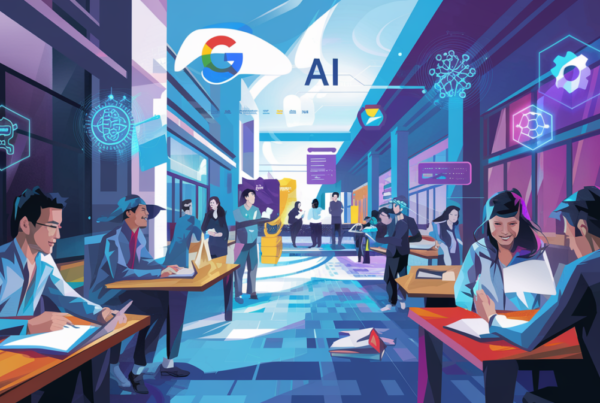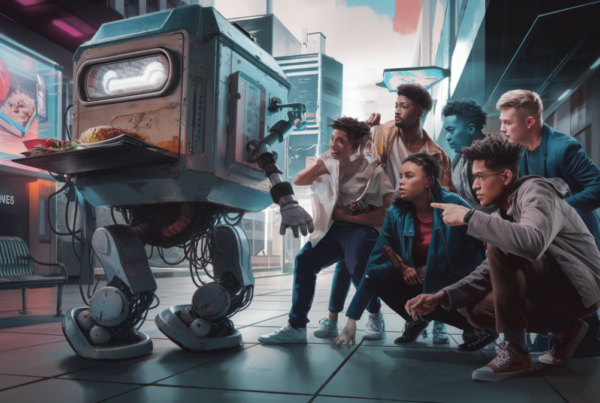Hey, have you ever caught yourself wondering about AI and its huge impact on our everyday lives? It’s not just you. The buzz around responsible AI is everywhere.
And it’s no surprise, really. With AI stepping into almost everything we do, we need to chat about the big questions.
Is it fair? Is it safe? Who’s keeping it in check?
Let’s break it all down like you and I chatting over a pint, yeah?
What Is Responsible AI?
First things first. What’s the fuss all about?
When we talk about responsible AI, we’re chatting about using AI systems in ways that are ethical, fair, and transparent.
Imagine a guide for AI – helping it behave, not go rogue, and making sure it doesn’t stir up trouble.
In plain English, it’s about keeping AI in line.
Why Should We Care?
Well, look around. AI is in everything from your phone’s voice assistant to those sneaky algorithms suggesting your next Netflix binge.
But with great power comes great responsibility.
People need trust in the systems they depend on. And if these systems start acting shady? The trust crumbles faster than a biscuit in a cuppa.
The Big Questions People Are Asking
1. Is AI Taking Over Jobs?
Been there, asked that. And it’s a hot topic.
Let’s be real. Automatons and software are doing jobs humans used to do. It’s like sci-fi became real life, and not everyone’s thrilled about it.
But here’s a twist – while some jobs might vanish, others evolve or pop up. Think of jobs shifting rather than disappearing.
That’s how the world’s worked for ages, right?
2. Can AI Be Biased or Unfair?
Absolutely.
If the data AI learns from is skewed, AI starts having wonky ideas. Like teaching a kid with all the wrong books.
This is where responsible AI steps in, ensuring fair play.
Nobody wants an unjust AI. We want systems that cheer for everyone, not just a select few.
3. Who’s Holding AI Accountable?
Ah, the million-pound question.
From tech giants to governments, everyone’s having their say.
But the real deal is making sure there are rules that stick. Not just a bunch of folks nodding along.
The Core Principles of Responsible AI
Trust and Transparency
Start with trust. Peel back what’s going on under the hood with AI.
People need to see how decisions get made. It’s a bit like wanting to know the recipe of your favourite pie.
Fairness and Equity
Remember when we said AI can be biased? Sorting that out means ensuring AI systems treat everyone equally.
No dodgy business or back-alley dealings.
Privacy and Security
AI’s getting its hands on heaps of data. But who wants their personal stuff out in the open?
Responsible AI means constructing systems that secure what’s yours.
Accountability
When AI messes up, someone’s got to fess up.
It’s about creating a system where mistakes are owned, not brushed under the carpet.
Continuous Learning and Adaptability
AI isn’t static. It’s learning like a sponge.
It needs to adapt and evolve, picking up on the newest lessons to avoid past fumbles.
Real-World Examples of Responsible AI
Healthcare: More Than Just Robots and Scans
AI’s a game-changer in healthcare. From spotting diseases early to crafting personalised treatment plans, it’s a life-enhancer.
But, it has to be spot-on. Lives depend on it.
Finance: Money Management Meets Machine Learning
Every loan officer or investment advisor you talk to might be using AI tools.
The aim? To ensure fair lending and better financial products. But it’s crucial these tools aren’t skewed against any group.
Social Media: The Double-Edged Sword
Social platforms harness AI to suggest friends, ads, and even what news you see.
The challenge is fostering a healthy digital conversation, not polarising society further.
Autonomous Vehicles: Driving Change
These aren’t just fancy gadgets for tech enthusiasts.
Autonomous vehicles are poised to reshape cities and traffic as we know it. But safety and consensus are key before they’re everywhere.
How Can We Make AI More Responsible?
Alright, now you’re asking the right questions.
Encourage Open Dialogue
It’s not just tech boffins who should have a say. Everyone from users to ethical thinkers needs a seat at the table.
Support Ethical AI Research
Research is shifting gears rapidly. But it needs to keep ethics in tow.
Funding and supporting this is crucial for systems that truly benefit humanity.
Regulatory Frameworks
Not fun, but necessary.
Think of them as the playbook that ensures everyone’s on the same page. They’re the rules of the game.
What’s the Future Looking Like?
Can anyone really predict the future of AI? Not really.
But we can steer it in a direction that’s safe, fair, and beneficial to all.
AI’s like a wild stallion – full of potential, but needing guidance.
And I’m optimistic.
With all this chat around responsible AI, we’re crafting a future that’s a bit less Terminator and a bit more helpful sidekick.
Let’s Wrap This Up
Responsible AI isn’t just some buzzword; it’s the guiding light for AI development and deployment.
It’s all about harnessing technology for good, ensuring it benefits everyone.
So next time you hear about AI, whether it’s your smart home speaker or the latest headline-grabbing software, think about responsible AI.
Because, in the end, we want AI that’s not just smart, but also wise.
And there you have it!
We’ve opened the book on what responsible AI is, why it matters, and how it touches our lives daily.
And trust me, we’ll keep chatting because this story’s just getting started.







